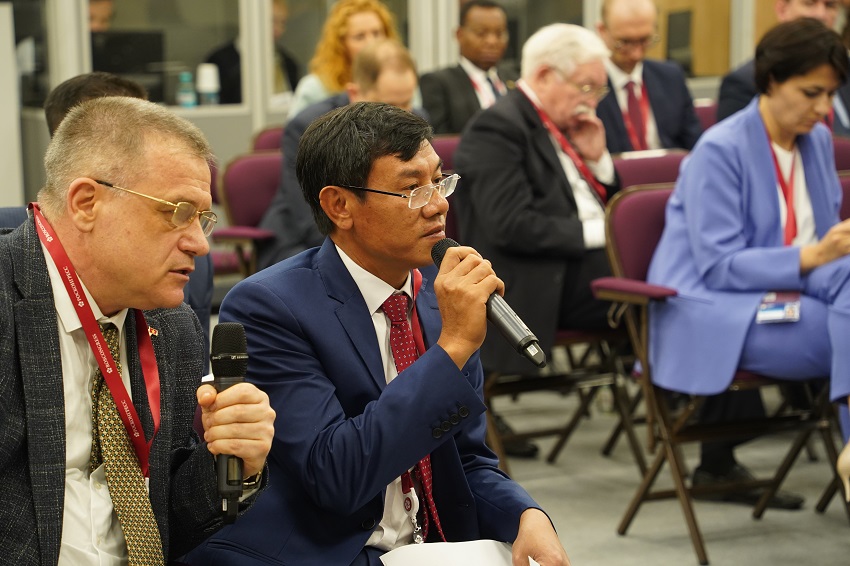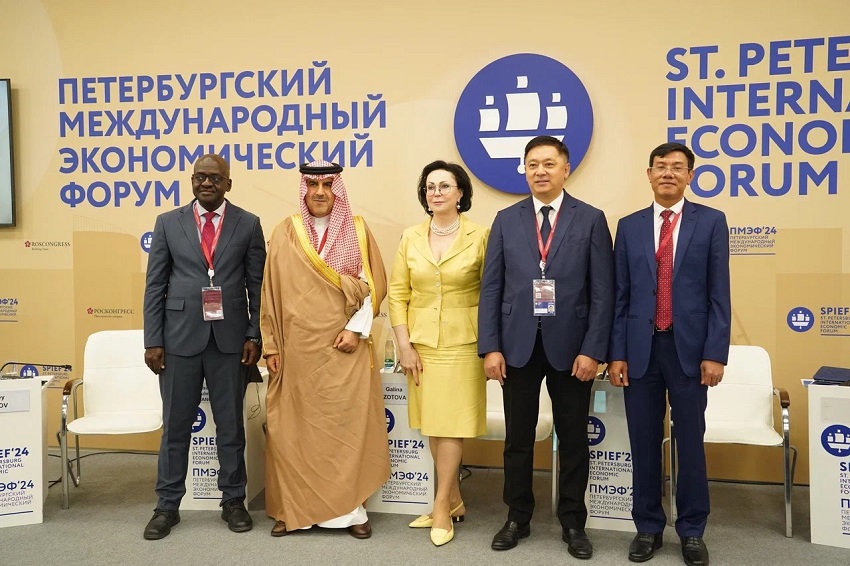(sav.gov.vn) - On June 6, the delegation of the State Audit Office of Viet Nam (SAV) led by Deputy Auditor-General Doan Anh Tho attended the special session of the St. Petersburg International Economic Forum (SPIEF) in St. Petersburg, Russia.

This session was organized on the initiative of the Accounts Chamber of the Russian Federation with the participation of the Supreme Audit Institutions (SAI) of Belarus, Kazakhstan, Saudi Arabia, Senegal, Viet Nam, and the host country, Russia.
At the session, the SAIs discussed the role of audit in the public administration system, its impact on citizens, and national development. The delegates also exchanged issues and challenges encountered in implementing new audit methods, the transformation of SAIs, roles of recommendations, and achievements in building effective public administration systems and sustainable national development, etc.

According to Mrs. Galina Izotova, Deputy Chair of the Accounts Chamber of the Russian Federation, the audit activities of SAIs play a crucial role in maintaining and increasing the accountability of government agencies. Essentially, auditing is a management function tasked with verifying the legality and accuracy of decisions, identifying errors, and proposing solutions to rectify those errors. Mrs. Galina Izotova suggested that it is necessary for cooperative space between SAI and controlled entities to create closer interaction with audited units, thereby enhancing the effectiveness of management decisions made by public administration bodies.
In his presentation on "SAV serves as an instrument for achieving national development priorities," Deputy Auditor- General of Viet Nam Doan Anh Tho highlighted Viet Nam national development priorities and the role of SAV in realizing these priorities. In recent years, SAV has paid special attention to selecting and conducting thematic audits on natural resources management, environmental protection, and climate change response, as well as policies supporting the Socio-Economic Recovery and Development Program, etc. These audit topics address issues in the spotlight with potential negative impacts on the socio-economic environment, drawing attention from the National Assembly, Government, and the public. Some specific notable audit topíc could be named as land and mineral resource management audits; climate change response audits; audits on the implementation of policies supporting the Socio-Economic Recovery and Development Program.
To effectively implement audits on national development priorities and become an effective instrument for achieving these priorities, SAV needs to realize plans through various specific actions, such as developing a roadmap for auditing the implementation of Sustainable Development Goals, Tho said. Furthermore, it is essential to focus on researching and auditing the preparedness for the implementation of the Sustainable Development Goals (SDGs) by the Government to evaluate the efficiency and effectiveness of Government efforts in localizing SDGs into the Viet Namese context, maintaining necessary resources and capacities, and establishing a mechanism for monitoring, evaluating, and reporting the progress of the 2030 Agenda realisation.

At the special session, Deputy Auditor-General Doan Anh Tho also shared the SAV experience in improving and enhancing the quality of performance audits to evaluate the implementation of national development priorities. He also specified SAV's contributions to national development priorities in terms of promoting green economic development, focusing on environmental protection, and effectively responding to climate change. Tho undelined that environmental audit (EA) is a crucial and breakthrough pilar in SAV's development strategy by 2030. "SAV continually innovates the organization of EA, prioritizing sector-wide audits, in parallel with reducing narrow-scope audits limited to a single entity, to conduct in-depth evaluations by specific areas" said the Deputy Auditor-General of Viet Nam. In addition, SAV always focuses on enhancing EA capacity; strengthening international cooperation in the field of EA, and increasing the transparency of EA results in the media to disseminate its management knowledge and experience; providing relevant information for units to better understand and be more concerned about preventing and mitigating shortcomings./.